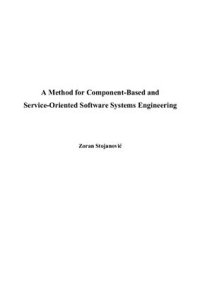
Ebook: A Method for Component-Based and Service-Oriented Software Systems Engineering
Author: Stojanović Z.
- Genre: Computers // Information Systems
- Tags: Библиотека, Компьютерная литература, Service-Oriented Architecture (SOA)
- Language: English
- pdf
Doctoral Dissertation, Faculty of Technology, Policy and Management, Delft University of Technology, The Netherlands.Febodruk BV, 2005. – 269 pages.
A method for software systems engineering following component-based and service-oriented concepts, principles and practices is designed and presented in this thesis. A set of consistent and technology-independent component concepts is defined in the method, together with the types, facets and granularity levels of components in the context of the development process lifecycle. The component concepts are modeled throughout the development process, depending on the reason for the modeling and specification, using techniques and notations based on Unified Modeling Language (UML) 2.0, Interface Definition Language (IDL) and eXtensible Markup Language (XML), enriched with extensions where necessary. The method further provides pragmatic guidelines, techniques and milestones that use the defined concepts and notations to facilitate a stepwise development process in a component-based and service-oriented manner. The method prescribes which activities should be carried out within each step of the development process and provides guidelines to develop appropriate models. We believe that our method is general, flexible and scalable enough to be used in component based architectural design and development for a wide range of IT systems, from small-scale desktop applications to complex, Internet-based, enterprise-scale IT systems.Contents:
Components and Services
The State-of-the-Art of Component-Based Software Systems Development
Component-Based Development in Practice
Component Concepts and Definitions
Component Modeling Techniques and Notations
Component-Oriented Architecture Design and Implementation
Test and Evaluation of the Method
Epilogue
Appendix A UML 2.0 Modeling Notation
Appendix B Survey Questionnaire
Appendix C List of Abbreviations
A method for software systems engineering following component-based and service-oriented concepts, principles and practices is designed and presented in this thesis. A set of consistent and technology-independent component concepts is defined in the method, together with the types, facets and granularity levels of components in the context of the development process lifecycle. The component concepts are modeled throughout the development process, depending on the reason for the modeling and specification, using techniques and notations based on Unified Modeling Language (UML) 2.0, Interface Definition Language (IDL) and eXtensible Markup Language (XML), enriched with extensions where necessary. The method further provides pragmatic guidelines, techniques and milestones that use the defined concepts and notations to facilitate a stepwise development process in a component-based and service-oriented manner. The method prescribes which activities should be carried out within each step of the development process and provides guidelines to develop appropriate models. We believe that our method is general, flexible and scalable enough to be used in component based architectural design and development for a wide range of IT systems, from small-scale desktop applications to complex, Internet-based, enterprise-scale IT systems.Contents:
Components and Services
The State-of-the-Art of Component-Based Software Systems Development
Component-Based Development in Practice
Component Concepts and Definitions
Component Modeling Techniques and Notations
Component-Oriented Architecture Design and Implementation
Test and Evaluation of the Method
Epilogue
Appendix A UML 2.0 Modeling Notation
Appendix B Survey Questionnaire
Appendix C List of Abbreviations
Download the book A Method for Component-Based and Service-Oriented Software Systems Engineering for free or read online
Continue reading on any device:

Last viewed books
Related books
{related-news}
Comments (0)